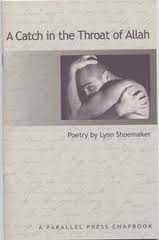Book Review
A Catch in the Throat of Allah by Lynn Shoemaker, Parallel Press, 2010. $10
Reviewed by Kathleen Serley
A Catch in the Throat of Allah by Lynn Shoemaker is a slender book, just 12 poems in 26 pages. I suppose on a bookshelf, one might look right past it. But open this chapbook, read Shoemaker’s prose poems and you will not forget this collection.
"Dust Cloud" begins the book and with its lyrical imagery, sets the scene for Shoemaker’s perceptive response to 9/11 and its aftermath, the theme that connects these poems and secures them in our memory:
And now the dust comes over us, whitish, not so fine as sleep, not so coarse as terror. It sticks like a muttering, a moan. Meddler. Scar picker. Step by stairway, it works into the floor cracks, street cracks, what we’ve never been able to mend. Will the mercy rain ever return? Exilic, we’re walking, then rushing away from ourselves. Our feet glyph shapes we’ve never know before. Sometimes, we think we’re breathing time, not air. Can we quit, stop, uptown, downtown, ever? Perhaps our lungs will tell us, the grit of the dead inside deliver up its pain. Will our stumbling, ghosted, ghosted, make the new names possible, visible? Our feet are praying for us, quick breathless prayers, begging a way through the burning and the burned.
As a reviewer, I should be able to examine the imagery and comment intelligently on the tone. But I am silenced by the “whitish dust” that works into the floor cracks opening scars. Readers may recall in the days after 9/11 longing for “the mercy rain” and praying “quick breathless prayers, begging a way through the burning and the burned.”
Descriptive and rhythmic language is a distinguishing characteristic of prose poems. "My 9/11 Back Tattoo/Last Word to My Daughter" is a good example of the language that names this paragraph a poem:
This is how I hope it will be. When you first turn my body, may your fingers be drawn to the sunshine shape, cast at the bottom of my spine. May their nerve tips recognize the plaza where you danced at only 19, both legs alive with the heat of those two tallest buildings. May you run both hands up my devil’s backbone, judging the heft of each structure, one on either side. I want your hands to blaze with the star-spangled explosion on the left and freeze 9:02 still with that darkening smudge sign on the right.
We feel the strength and life of legs which nonetheless did not carry anyone to safety as Shoemaker artistically merges this image with the collapse of the twin towers. Shoemaker’s juxtaposition of word choice, star-spangled to describe explosion and the happy heat of dancing legs connected with the angry heat of the collapsing towers, keeps the reader a little off-balance.
Although each poem offers a dramatic interpretation, "The Mercy Singers" which concludes the collection is the signature work. Seven pages long, it explores our present as we play out our reactions to 9/11. According to the brief biography which accompanies the chapbook, Shoemaker joined a Christian Peacemaker Team delegation in 2005 and “worked for a short time in Iraq.” It seems to me"The Mercy Singers," which was nominated for a Pushcart Prize, must have been inspired by his experiences during this time in Iraq.
The poem is developed through the voices of four peace workers telling their stories. The first is Meredith who remembers the times she enjoyed with her husband as they explored the Saturday markets and coffee shops of the thriving city. Her memory is interrupted with the words
“Holy shit
The plane flew right into…”
and we next see her in a place of “dustland” and “shadows” talking to a “woman in black":
But I manage to mumble that my husband called on his cell phone. Said he was on the 53rd floor. Said he was going back up. Meena says that her husband was in the courtyard. Just outside the back door. No time to go anywhere.
The concrete language of this terse exchange expertly represents the futility of war, the universality of grief.
As the poem progresses, each character’s story is dramatic with memories invading present reality. Gideon has lost his daughter, Jim Jim his mother and Towana Jo her brother. Their expressions of grief draw us in, but Shoemaker deftly develops the contrast between this grief and the tragedies the characters discover among the persons with whom they seek a connection. The tension in this contrast, as the reader struggles to place empathy, establishes the theme. The poem ends with a wedding turned funeral for the young bride. The tragedy is told through the eyes of Towana Jo who is also mourning her brother who died when the towers collapsed:
A wedding party, friends and relatives from miles around, just like daddy gave me. Men got all joy-fevered up, started shooting their rifles in the air. Next thing they knew, they heard jets. They didn’t hear the rockets until they hit. Nineteen dead, including the father and the daughter bride. Grandma in Black motions over to another one of the daughters. Looks about 12 or 13. I’ve never seen grief piled so high in any child’s eyes before. It’s like her skin is so heavy it wants nothing to do with her bones.
Shoemaker indicates in the preface that he needed encouragement to offer his 9/11 poems for publication. Certainly, they are not easy to read. But his interpretation of this time in our history makes this collection a valuable contribution both to our collective culture and to poetic expression.
A lifelong resident of Wisconsin, Kathleen Serley enjoys all of our seasons: spring gardening, summer beach combing, fall hiking and winter snow shoeing. She teaches English.


